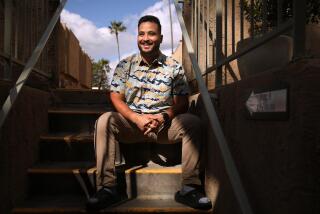The luck of the draw
- Share via
ANTHONY HOLDEN raises the specter of obsession exactly once in his new book, “Bigger Deal,” and then only obliquely. The date is August 2000, and his biography of William Shakespeare has just been savaged by the New York Times. His American wife wants a divorce; the transplanted Londoner is stranded in Manhattan. One evening, he decides he has a “straightforward choice between poker and suicide.” He chooses poker.
“Such placebos, of course, generally don’t work in radical crises,” Holden admits, “but this one, miraculously, did -- at least for that wretched evening. It’s something to do with the degree of tunnel vision required in a game where the stakes are high enough and the dangers attendant upon letting your mind wander even for a moment.”
It’s not addiction, although it comes close. This “therapeutic” and sentimental force that renders most of his world a baize is love, actually.
It began in 1988. Holden, a career journalist and the author of biographies of Tchaikovsky and Sir Laurence Olivier, chronicled a year in the life of a professional poker player. The resulting 1990 book, “Big Deal: A Year as a Professional Poker Player,” won him a regular column for Esquire magazine, a BBC documentary and a good deal of fame.
But as Holden writes in his arresting sequel, “Bigger Deal,” a card shark can hardly be content to rest on his laurels. By 2005, he is getting restless; the wife is gone, the alimony is paid, and he’s moved back to London to write about classical music. He competes in a few small tournaments but can’t shake the feeling that “with guile, perception, courage and grit -- between them, a definition of what the top players call ‘heart’ -- anyone can bend the odds in their favour and learn to beat the game.”
It’s time, in other words, to hit the road. So on July 7, 2005, Holden arrives at the World Series of Poker in Las Vegas, intent on breaking into the winner’s circle. “Big Deal” had chronicled a game rooted in manners, morals and artistry. Nearly 20 years later, American tournaments, Holden quickly discovers, have become noisy and chaotic affairs, played by thousands of Web-weaned twentysomethings huddled under bright lights in sprawling conference halls. These players are impulsive, brash and fast, and in large numbers, brash and fast can -- depending on the draw -- run roughshod over experience and craft.
“I may as well be putting money into slot machines,” author James McManus tells Holden of the no-limit hold ‘em played at the WSOP. “The luck factor is so ridiculously high that I’m really left with no other conclusion than [it] isn’t really a skill game, all things considered.”
The culprit, for stalwarts like McManus, whose book “Positively Fifth Street” details his experience playing the tournament in 2000, is “the boom.” When Benny Binion staged the first organized World Series of Poker at the Horseshoe in Las Vegas in 1971, six contestants kicked in $5,000 each for a purse of $30,000. In recent years, the WSOP has grown at a rate of 200%. Last year, the combined prize money for the main event was more than $82.5 million, with the winner taking $12 million.
This cash is channeled partly through low-stakes matches called “satellites,” which allow amateur players to parlay small amounts of money into the $10,000 entry fee. (The 2003 and 2004 winners, Chris Moneymaker and Greg Raymer, qualified in online satellites.)
Today, Holden reports, 80 million people play poker regularly, more than a third of whom live in the United States. This has led to a desiccation of intimacy. Players start younger and think harder about the game in the electronic isolation of video or online poker. When they finally hit Vegas, they play sullenly or wordlessly -- a sea of down-turned baseball caps and hooded sweatshirts. Product placement “has run amok.” B-list celebrities are paid to play in televised tournaments. In 2006, PokerShare.com entered a chimp named Mikey in the WSOP.
Still, Holden decides, “The game’s universal appeal” has been magnified by the proliferation of online casinos, allowing players to go head-to-head with “millionaires and hoboes.... [P]oker’s eternal verities at once render everyone equal.”
Most of “Bigger Deal” is about Holden’s head-first dive for prize money. After the 2005 WSOP, he plays the grand finals of the European Poker Tour, the World Cup of Poker in Spain and finally the 2006 WSOP; he wins money, loses it, makes some back and rubs elbows with the surprisingly skilled new guard.
Holden loves the interplay, “the reading of other people’s minds. The thrilling sense of triumph when you sense something that turns out to be right; the disproportionate despair when you’re wrong or the poker gods rule against you.”
And that’s the conceit: In “Bigger Deal,” even the most complex hands of poker are only transactions of skill or haste, of fear or courage.
More to Read
Sign up for our Book Club newsletter
Get the latest news, events and more from the Los Angeles Times Book Club, and help us get L.A. reading and talking.
You may occasionally receive promotional content from the Los Angeles Times.









